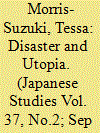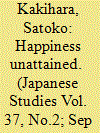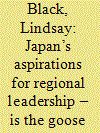|
|
|
Sort Order |
|
|
|
Items / Page
|
|
|
|
|
|
|
| Srl | Item |
| 1 |
ID:
155312


|
|
|
|
|
| Summary/Abstract |
This article examines the experience of crossing legal, political, and socio-cultural boundaries by Japanese migrant women in international marriages in Australia. The data is drawn from oral history interviews with 16 Japanese women living in Australia and married to Australian citizens or permanent residents. Australia is one of the most popular destinations for Japanese emigrants. For Japanese women in particular, applying for permanent residency as a spouse of an Australian citizen or permanent resident has been a popular settlement path. I analyze the women’s negotiations between their perceptions of socio-legal systems constructed in Japan and their newly experienced social reality in Australia. The women’s negotiations reflect their individual ways of crossing boundaries. Their practices of the Japanese socio-legal custom of changing one’s surname at the time of legal marriage provide a focus for the article. I argue that individuals’ experiences of crossing boundaries are shaped by, and embedded in, their personal histories constructed in their land of origin. In this sense, their act of ‘crossing’ means creating a connection between both sides whereby the rigidity of these boundaries is blurred.
|
|
|
|
|
|
|
|
|
|
|
|
|
|
|
|
| 2 |
ID:
155310


|
|
|
|
|
| Summary/Abstract |
This article takes the notion of the ‘disaster utopia’ as a starting point for reconsidering the impact of the Japanese triple disaster of 11 March 2011 (3/11). It has often been observed that disasters may lead to utopian longings for a better world, and that these may, in some cases, lead to long-term social and political change. Drawing particularly on the ideas of Charles Fritz and Rebecca Solnit, the article briefly surveys the history of ‘disaster utopianism’ in Japan before exploring the specific versions of the search for ‘world renewal’ that emerged from 3/11. I argue that the ideas put forward by Fritz and Solnit can help us to reassess some of the widely accepted images of the response to 3/11. The 2011 disaster generated visions of a new world which, although profoundly divergent in their social implications, shared a common vocabulary centred upon terms such as saisei (regeneration) and kizuna (bonds of community). Exploring trends in postwar Japan through the prism of the ‘disaster utopia’ can, I suggest, shed new light on the processes of political change that have affected Japan in the years since 3/11.
|
|
|
|
|
|
|
|
|
|
|
|
|
|
|
|
| 3 |
ID:
155313


|
|
|
|
|
| Summary/Abstract |
Following the March 2011 Tōhoku earthquake, tsunami and the subsequent nuclear meltdowns in Fukushima (referred to collectively as ‘3.11’), critical discourse in Japan has become increasingly tense. Public debate about nuclear power has polarized society, and commentators, as well as ordinary citizens, are pressuring each other to choose between two ideological extremes. With this stifling atmosphere in the intellectual world, fiction has become an important creative venue outside the constraints of other written publications, such as non-fiction and journalism. The fictional aspect of what is known as ‘3.11 literature’ allows authors to express their opinions freely, portraying a side of Japanese society that does not appear in mainstream media. One such author is metafiction writer Takahashi Gen’ichirō, who spearheaded these fictional responses to 3.11 with his 2011 novel, Koisuru genpatsu (A Nuclear Reactor in Love). Through an analysis of this text, I will argue that this seemingly playful, experimental and at times even offensive work contains a serious exposé of problems confronting literary and political expression in post-3.11 Japan.
|
|
|
|
|
|
|
|
|
|
|
|
|
|
|
|
| 4 |
ID:
155311


|
|
|
|
|
| Summary/Abstract |
Much scholarship on gender ideologies under Japanese imperialism remains demarcated by temporal and spatial lines. This article instead conceives the Japanese empire as a continuum, examining writings by women who published in and outside of East Asia, during the imperialist period and after decolonization. Specifically, it examines the femininities constructed in works by Japanese writer Ōsako Rinko (1915–2003) and Taiwanese writer Yang Qianhe (1921–2011), whose lives traversed geopolitical borders and ideological shifts from imperial modernization through decolonization. Showing how colonial modernity influenced gender constructions in different ways depending on the writers’ positionalities, this article illustrates how the writers negotiated happiness and spaces of belonging (whether geospatial locations in which to situate themselves, or daily practices and roles to perform) through their works. Furthermore, the article argues that freedom and happiness described by the two were consistently unattainable and postponed to a geopolitical temporality of dominance – the Japanese metropole, the United States, the imaginary West. The article thus examines gender and power among East Asian nations and the United States throughout the twentieth century.
|
|
|
|
|
|
|
|
|
|
|
|
|
|
|
|
| 5 |
ID:
155309


|
|
|
|
|
| Summary/Abstract |
Japan’s rise has often been conceived in terms of the ‘flying geese’ model in which Japan led a flock of emerging East Asian economies as its production networks expanded and it shed outdated technologies to the followers. Though the model implied a continuing Japanese leadership role in the East Asian region, two lost decades have undermined Japan’s claim to head the flock of ‘flying geese’ and Japan is often perceived as in decline relative to China’s rapid rise. This paper challenges such accounts to argue that Japan still has significant leadership ambitions and, potentially, the means to bring them to fruition. Understanding Japan’s leadership ambitions requires conceptualizing power in terms of discursive as well as material resources. Doing so highlights how different policymakers articulate contrasting visions of how Japan should take the lead in East Asia. These visions are of Japan as (variously) a functional leader, a conveyer of universal values, a conformist to ASEAN norms, a strategic partner and a promoter of open regionalism. Whilst most analyses have focused on Japan as a declining power, it is the spatial, temporal and ethical incompatibility of these regional visions that undermines Japan’s aspirations to lead the East Asian region.
|
|
|
|
|
|
|
|
|
|
|
|
|
|
|
|
| 6 |
ID:
155314


|
|
|
|
|
| Summary/Abstract |
Gender, particularly the figure of the shōjo, plays a crucial role in the creation of heroes and the development of plots in Japanese popular texts. This paper focuses on The Cat Returns (Neko no ongaeshi) (2002, dir. Morita Hiroyuki), one of the lesser-known films produced by Studio Ghibli. A socio-political reading and gender-sensitive analysis reveals that this film offers a deep and critical commentary on the gender order in contemporary Japan. Moreover, with its teenage girl protagonist Haru, it presents an exceptional case of a shōjo-centred anime that does not fit conventional genre characteristics. Through Haru’s refusal to become a wife in the Cat Kingdom the film criticises the expectation for young women to prioritise the pursuit of romantic relationships (ren’ai), and rejects the ideal of the Japanese housewife (shufu) as an existence of dependence in a semi-feudal social gender order. This paper views Haru’s coming-of-age story through major gender theories, and interprets the plot as a critique of what Ueno Chizuko and Nobuta Sayoko (2004) called the ‘Marriage Empire’ in Japan. We argue that the anime reflects shifting ideas on gender and at the same time presents an exceptional treatment of the need for young women to confront the social changes and gender role expectations of contemporary Japanese society.
|
|
|
|
|
|
|
|
|
|
|
|
|
|
|
|
|
|
|
|
|